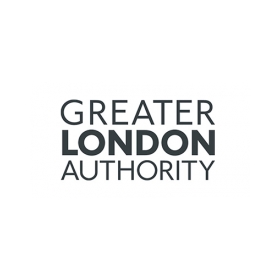A personalised message from Martin Lewis CBE, recognising the hard work Citizens Advice Harrow has done, and the positive impact we have had on the local community.
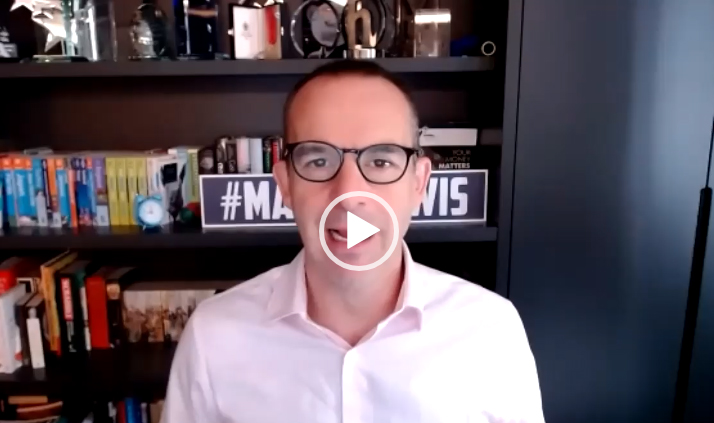

A personalised message from Martin Lewis CBE, recognising the hard work Citizens Advice Harrow has done, and the positive impact we have had on the local community.
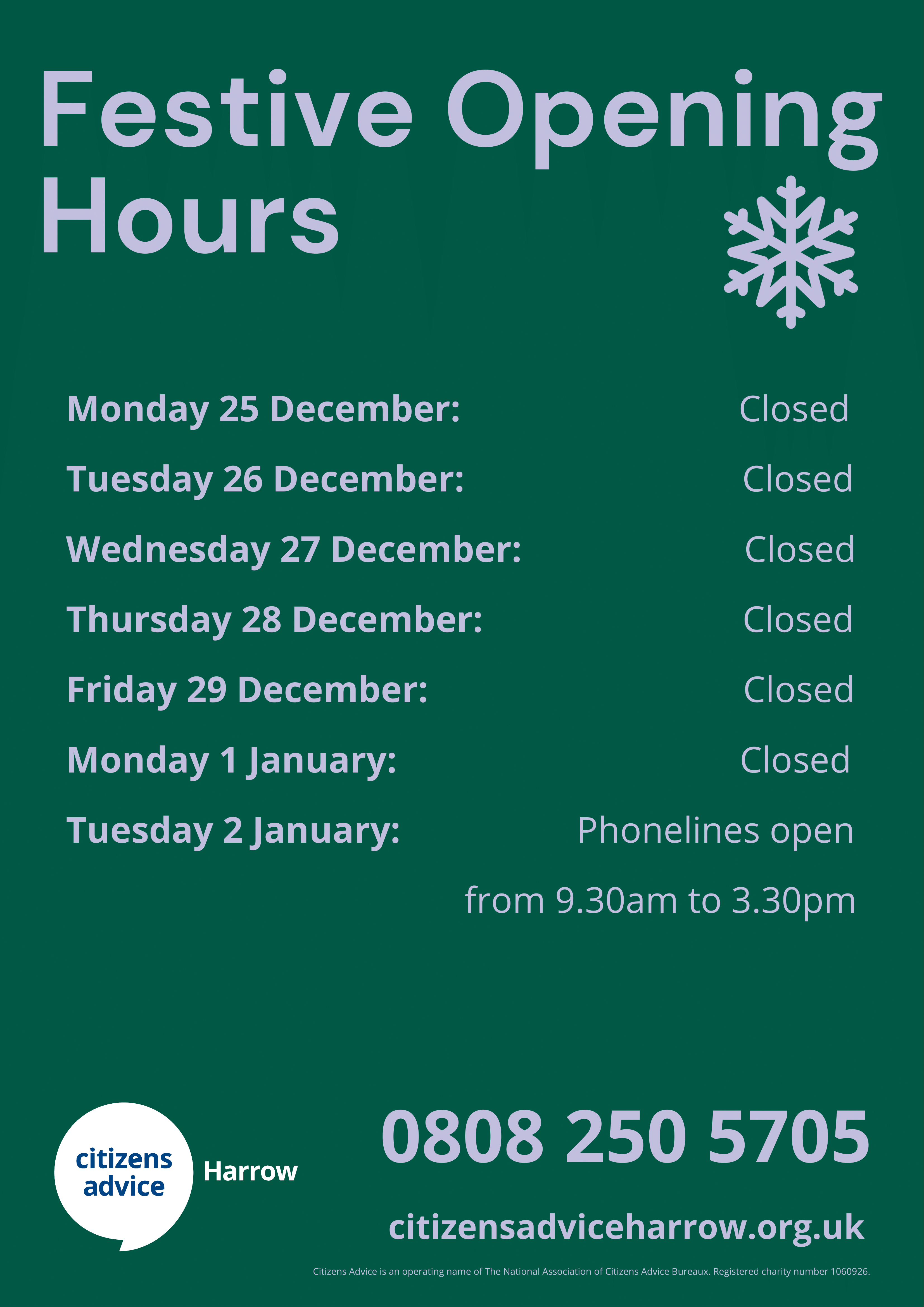
Harrow Council’s Social Services:
Monday-Friday 9am-5pm 020 8901 2680
Out of Hours 020 8424 0999
Domestic Violence
Free phone 24/7 0808 2000 247
Reporting homelessnes 020 8424 1093
Email: housing.advice@harrow.gov.uk
Homeless Enquiry Form: www.harrow.gov.uk
Rough sleepers – Streetlink (24/7) 0300 5000 914
Served eviction notice www.harrow.gov.uk
Harrow Food Bank 020 8416 7344
Holy Trinity Church Wealdstone HA3 5QX: Normal Day (Tues/Fri)
South Harrow Baptist Church HA2 8EB: Normal Day (Mon)
Rayners Lane Baptist Church HA2 7HW: Normal Day (Sat)
Kenton Methodist Church HA3 0XF: Normal Day (Wed)
Harrow Warm Hubs www.harrowgiving.org.uk/warmhubs/
Help to Claim National number 0800 328 5644
Citizens Advice Help to Claim 0800 144 8444
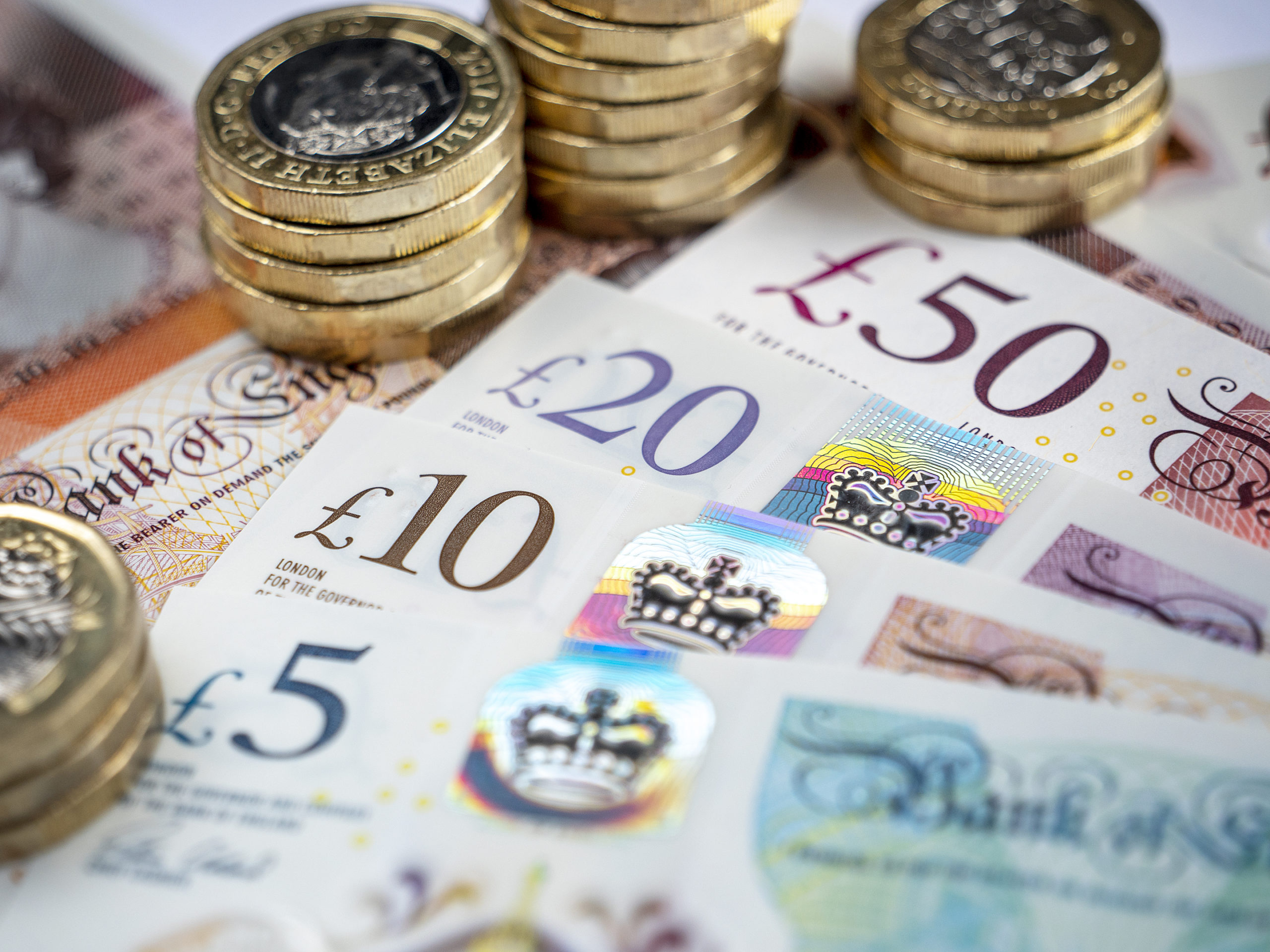
We are Citizens Advice

Festive shopping season is approaching. Online shopping can be convenient and save you time — but whether you’re shopping for your loved one’s presents, festive decorations or just treating yourself, make sure you take steps to protect yourself.
Here’s our top tips to avoid scams and help you shop online safely this festive season:
If it seems too good to be true — it probably is. This is especially true for products which are ‘must-haves’ or are sold out in major retailers. It may seem like the perfect present, but you might end up with nothing.
Be wary of sites offering big discounts, and ensure that you’re buying from the retailer’s official website so that you know it’s a genuine product. You can find out if a company is registered by searching their details on gov.uk. Sole traders (someone who runs their own business) and partnerships (where two or more people run a business together) don’t need to register with gov.uk, so you’ll need to do further research on their site to make sure they’re a genuine seller
Do some background research into the company. Start with an internet search about the retailer and have a look at their official website. Make sure you find their return and refund policies so you can understand your rights if something goes wrong with your purchase. Find out how they can be contacted, where in the world they’re based and whether they’re part of a consumer protection scheme.
Seeing what others say about the retailer can help you find out if it’s a legitimate seller or not. But remember to look into reviews on other websites too, not just their official website.
Be cautious when a seller asks you to pay by an unusual means such as in iTunes vouchers, crypto currency or via bank transfer. These are harder to track and lack the vital protections that you get when paying by debit or credit card or by a third party app such as PayPal. Whichever way you pay, make sure you check the terms and conditions to understand what you’re paying for.
We can help you understand your consumer rights and stay #ShopAware.
Find out more about your rights on our consumer advice pages and contact our Consumer Helpline if you need more help.
Article is written by Laura Humayun at Citizens Advice, source https://wearecitizensadvice.org.uk/shop-online-safely-this-festive-season-4a1149c12c7e
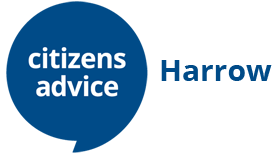
Our new address will be 4 Gayton Road, Harrow, HA1 2FB.
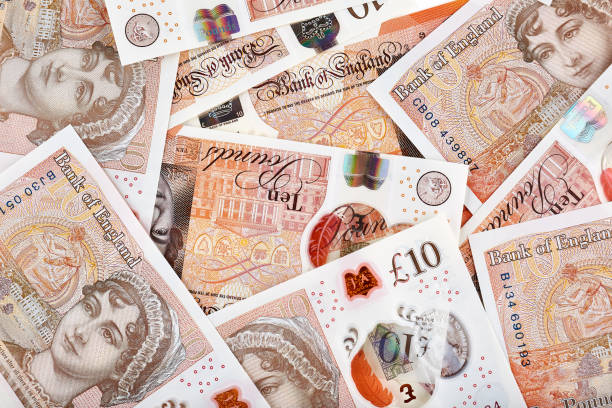
Scams Awareness is an annual campaign aiming to:
https://wearecitizensadvice.org.uk/what-scams-you-should-look-out-for-3ebb563627b1 Scammers reach out in a number of ways, providing substandard services and trying to take your money. This could involve someone contacting you unexpectedly by telephone or email, coming to your door with a too good to be true opportunity or offering false information through online advertising.
We’re helping you stay #ScamAware by sharing 5 scams you should be on the lookout for…
There’s been an increase in the number of people receiving messages claiming to be from their relatives/children, asking them to reply on a new number before requesting money.
If you get one of these messages — be suspicious. Don’t be rushed into making any quick decisions. It’s okay to take your time, and if someone is pressuring you to send money or personal details then it’s most likely a scam.
Try and contact your relative/child directly on a known number, or ask them to share a voice note, to confirm if the message is genuine. Only consider the request if you’ve done these checks and are 100% sure the request is from someone you know and trust.
We’ve seen a number of people being scammed when booking home improvements this year.
If you’re being pressured to pay upfront for work, or the company you’re working with is adding on additional costs before completing the work, it might be a scam.
Find out more on how to avoid home improvement scams here.
Watch out for fake adverts when shopping online. If you spot something you want to buy, make sure you protect yourself by:
When purchasing a car, avoid scammers by doing the following:
Find out more about protecting yourself when buying a used car on our website.
If you’re contacted for an investment opportunity unexpectedly by email or social media, it could be a scam.
If you’re not sure about a financial opportunity you’re being offered, get advice from a trusted source and don’t be rushed into making any quick decisions. It’s okay to take your time.
Never give money or personal details, like passwords or bank details, or transfer cash to someone you don’t know or have only met online.
Then we’re here for you! Visit our website for all of our advice or contact us to speak to one of our advisers.
You can also head to Friends Against Scams to learn more about how to protect yourself and your loved ones from scams.
Useful links:
Blog by Jessica Rigby https://wearecitizensadvice.org.uk/
What can people do?
Stop and get advice. Contact Citizens Advice online at citizensadvice.org.uk/scamsadvice or on 0808 223 1133 (0808 223 1144 for Welsh language).
Report scams to Action Fraud on 0300 123 2040 or @actionfrauduk on Twitter.
Talk with friends, family and neighbours about scams they’ve experienced.
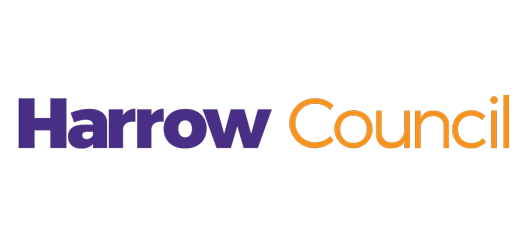
Harrow Council has received funding from the Department for Work and Pensions (DWP), to spend on supporting vulnerable households with the rising cost of living. This grant is called the Household Support Fund (HSF).
The Council is partnering with Citizens Advice Harrow to deliver financial support by distributing part of the HSF grant to eligible residents in the form of vouchers.
For more information, please visit https://www.harrow.gov.uk/benefits/household-support-fund and https://www.gov.uk/cost-living-help-local-council
You can contact us by phone https://www.citizensadviceharrow.org.uk/phone/ for application process or via email hsf@citizensadviceharrow.org.uk

Citizens Advice Harrow are pleased to announce that water issues have been resolved and we have resumed to normal Face to Face service. Thank you for your patience and co-operation. Once again apologies for any inconvenience this may have caused.
We are currently experiencing a water supply issue and are working with Harrow Council to resolve the issue. The office for face to face appointments will be closed until further notice. The telephone Advice line will operate as normal, the staff & Volunteers will work from home. We apologise for any inconvenience caused.
Citizens Advice Harrow thanks its volunteers for their vital support during cost-of-living crisis
As the cost-of-living crisis bites, Citizens Advice Harrow has seen a huge number of enquiries from local people struggling to stay on top of household bills.
Thanks to the tireless dedication of its volunteers and staff, Citizens Advice Harrow has continued to give essential advice and crisis support to help people find a way forward.
As part of Volunteers’ Week, which runs from 1 to 7 June 2023, Citizens Advice Harrow wants to thank its volunteers for their exceptional contribution to the charity and local community.
This year for Volunteers’ Week, we are organising free lunch EVERY DAY of Volunteer’s Week, as a small token of our appreciation.
29 volunteers at Citizens Advice Harrow contribute 161 hours each week.
In the last year Citizens Advice Harrow have dealt with 14,375 issues, mainly in debt, housing, benefit and employment. In the past year, we have made 23,435 activities and have generated an income gain of £988,013.
Veena, one of the volunteer Receptionists at Citizens Advice Harrow has volunteered for 9 years. They said:
Helping others is the best way to help myself with positive energy and greater understanding of the current socioeconomic situation in Harrow. I meet people from all walks of the community and understand their day-to-day difficulties.
Volunteering helps me with better physical and mental health. I feel helping others keeps me socially connected and energises me to face the challenges, I encounter in my personal life as a mother and a grandmother.
Tajinder Nijjar, Chief Executive Officer/Chair at Citizens Advice Harrow said:
We have an incredible team of volunteers who freely give their time and skills to ensure people in Harrow can get support in their time of need.
I’m particularly proud of the immense dedication they’ve shown during the ongoing cost-of-living crisis, when demand for our service is so high. Their dedication and commitment to the local community knows no bounds.
We dealt with over 14,000 issues in the past year, and this wouldn’t have been possible without our fantastic team of volunteers.
Thank you for everything you do.
If you’re interested in finding out more about volunteering with Citizens Advice Harrow, visit our website www.citizensadviceharrow.org.uk/volunteering to download an application pack. No experience is required, full training and support is provided for volunteer roles.


Scams Awareness is an annual campaign aiming to:
Paying more for something than you think it’s worth isn’t the same as being scammed. Usually, a scam will involve theft or fraud.
You have other rights if you think you’ve overpaid.
If you’ve given away money or information because of a scam, there are things you should do. Check what to do if you’ve been scammed.
If you haven’t been scammed but you’ve seen something you think is a scam, you should report it. Find out how to report a scam.
If you think someone is calling to trick you into giving them money or your personal details, hang up and call 159. This is a secure service that connects you directly with your bank.
Calls to 159 are usually charged at the national rate – it depends on your provider.
Check if your bank uses 159 on the Stop Scams UK website.
There are things you can do to protect yourself from being scammed online.
You can search for a company’s details on GOV.UK. This will tell you if they’re a registered company or not.
If you’re buying something on a site you haven’t used before, spend a few minutes checking it – start by finding its terms and conditions. The company’s address should have a street name, not just a post office box.
Check to see what people have said about the company. It’s worth looking for reviews on different websites – don’t rely on reviews the company has put on its own website.
Also, don’t rely on seeing a padlock in the address bar of your browser – this doesn’t guarantee you’re buying from a real company.
Don’t click on or download anything you don’t trust – for example, if you get an email from a company with a strange email address. Doing this could infect your computer with a virus.
Make sure your antivirus software is up to date to give you more protection.
Some scammers try to get your personal information – for example, the name of your primary school or your National Insurance number. They can use this information to hack your accounts. If you come across sites that ask for this type of information without an obvious reason, check they’re legitimate.
Sometimes your log-in details can be made publicly available when a website is hacked. This means that someone could use your details in a scam. Check whether your accounts have been put at risk on Have I Been Pwned.
Make sure you have a strong password for your email accounts that you don’t use anywhere else. If you’re worried about remembering lots of different passwords, you can use a password manager.
Some websites let you add a second step when you log in to your account – this is known as ‘two-factor authentication’. This makes it harder for scammers to access your accounts.
Find out how to set up two-factor authentication across services like Gmail, Facebook, Twitter, LinkedIn, Outlook and iTunes on the on the National Cyber Security Centre website.
Pay by card to get extra protection if things go wrong. Read our advice on getting your money back after you’ve been scammed.
Check your bank’s website to see how your bank will and won’t communicate with you. For example, find out what type of security questions they’ll ask if they phone you.
To find out about scams across the country, you can sign up to the Trading Standards email alert on their website. Trading Standards can investigate and take court action against scammers.
If you want to know about scams in your local area, sign up for email alerts on Action Fraud’s website.
You can also find out about common financial scams on the Financial Conduct Authority’s website.
Useful Links
Campaign page for stakeholders/campaigners
Financial Conduct Authority scams pages

Citizens Advice Harrow will be CLOSED on WEDNESDAY 24 MAY 2023, due to staff training.
Apologies for any inconvenience caused.

Cost of Living Crisis Prevention Project – funded by the Greater London Authority
Citizens Advice have a new project to assist people who are struggling with bills, during the cost-of-living crisis. The aim is to give advice to people to prevent financial difficulties becoming a crisis.
Our Crisis Prevention Adviser can help to MAXIMISE INCOME:
To refer a client, make a direct referral to us:
https://www.citizensadviceharrow.org.uk/email/make-a-referral/
Training for you and your colleagues: ADVICE FIRST AID training
To teach you how to spot urgent issues and emergencies and where they could signpost or refer people to. The Advice First Aid training would be over 2 full days from February – dates can be arranged – and is free of charge.
For more information please email an enquiry to: adminsupport@citizensadviceharrow.org.uk
SUPPORTED BY
